Catholic Medical Quarterly Volume 66(4) Nov 2016
Reports
The Principles and Practice of Palliative Care in The Year Of Mercy:
Catholic Medical Association’s 2016 Annual Conference
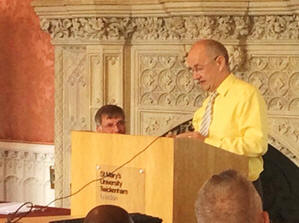 Fellowship, solidarity and inclusion must be central elements of good
Christian living and as a society with a group of individuals sharing a
common purpose, values, beliefs and mission, the Catholic Medical
Association strives to ensure fellowship, solidarity and inclusion are
central to its aims.
Fellowship, solidarity and inclusion must be central elements of good
Christian living and as a society with a group of individuals sharing a
common purpose, values, beliefs and mission, the Catholic Medical
Association strives to ensure fellowship, solidarity and inclusion are
central to its aims.
In July at the Catholic Medical Associations Annual Conference at St Mary's University Twickenham in London lots of likeminded individuals who are members of the Catholic Medical Association came along to partake in a weekend of events. The theme of this conference day on the Saturday was the 'Principles and Practice of Palliative Care in the Year of Mercy' and it was fantastic that so many doctors, nurses, chaplains and other individuals associated with healthcare were able to attend and take an active part.
'Media vita in morte sumus' is a well-known Latin phrase that translates quite simply to 'in the midst of life we are in death' which reminds us that death will affect us all both directly and indirectly and in all honesty we do not know when.
 Palliative care is an issue of great importance within our society with
many clinicians and academics alike arguing that there should be more
investment from the Government, charities and other bodies to ensure the
delivery of safe, effective and high quality palliative care across the
United Kingdom. While many individuals may see palliative care as a simple
or straightforward concept we as healthcare professionals know that there
are many different issues and challenges associated with palliative care
and that as a concept it is not black and white or straight forward. There
are many individual, ethical, moral, practical, local, logistical and
spiritual elements that are central to ensuring that palliative care is
not only person centred but effective dignified, safe and compassionate.
Palliative care is an issue of great importance within our society with
many clinicians and academics alike arguing that there should be more
investment from the Government, charities and other bodies to ensure the
delivery of safe, effective and high quality palliative care across the
United Kingdom. While many individuals may see palliative care as a simple
or straightforward concept we as healthcare professionals know that there
are many different issues and challenges associated with palliative care
and that as a concept it is not black and white or straight forward. There
are many individual, ethical, moral, practical, local, logistical and
spiritual elements that are central to ensuring that palliative care is
not only person centred but effective dignified, safe and compassionate.
It was fantastic to be able to meet and network with other healthcare professionals and healthcare workers who hold many of the same values that I do and for me this was both professionally and spiritually up-lifting. The variety of speakers and audience participation provided on-going engagement throughout the day and it was encouraging to speak to others who firmly believe in the importance of high quality palliative care. The ethical and legal issues and challenges associated with palliative care are wide ranging and often complex and it was interesting to be able to explore and discuss these at the conference. Moreover it was of great professional interest to me that care of those around the dying person, both family and friends was discussed during the day as this concept must play a key role in palliative care overall.
The annual conference was an enjoyable event and it is encouraging that many new members are beginning to take a more active role within this fantastic organisation.
Donato Tallo is a registered nurse working in the acute hospital sector
CMA conference: The Principles and Practice of Palliative Care in the Year of Mercy July 2016
What an intriguing title! From the moment I knew the theme of this
year's Catholic Medical Association (CMA) conference, I knew I just had to
go. Palliative care is the field of medicine which inspires me most and is
what I hope to specialise in. So despite this conference weekend being
nestled between long on-call shifts with the rotation change-over looming,
I was always going to be in attendance!
On arrival, I found myself
sitting next to another doctor. Having just been on-call in a hospice that
very night, my conference companion would have had a better excuse than me
for feeling tired! She has since been able to give me some great tips and
career advice.
Commitment to the conference and the CMA was a theme that struck me repeatedly throughout the day. We were all very grateful to Tony Warren and the speakers for their immense work preparing for the conference. A promising new initiative of meetings aimed at junior members was also announced.
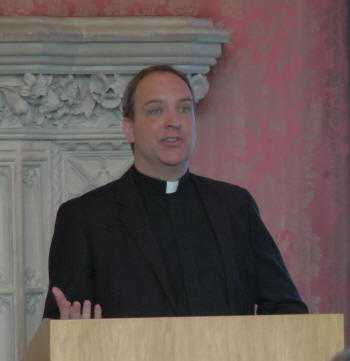 Of all the excellent speakers, one of my favourites was surely Fr John
O'Leary, the chaplain to the CMA. He gave a thoughtful and spiritual
reflection on what it is to be ill and around those who are dying,
illustrated by personal anecdotes of a relative's illness. While sad and
challenging, Fr John reminded us of the value of this time in our lives
for preparing us for death and thus to meet Christ Himself.
Of all the excellent speakers, one of my favourites was surely Fr John
O'Leary, the chaplain to the CMA. He gave a thoughtful and spiritual
reflection on what it is to be ill and around those who are dying,
illustrated by personal anecdotes of a relative's illness. While sad and
challenging, Fr John reminded us of the value of this time in our lives
for preparing us for death and thus to meet Christ Himself.
Ultimately, our lives are about knowing and loving Christ, preparing in this life for life in the next. Mr Colin HarHarte'sving talk on caring for a remarkable woman, Alison Davis, emphasised the transforming graces of reconciliation with Our Lord that can be obtained through suffering. He often referenced Pope Saint John Paul II’II'sostolic letter “Salvifici Doloris” – it’s now top of my reading list.
The talk that made me think the most, however, was delivered by Professor Pullicino, Professor of Clinical Neurosciences at East Kent Hospitals University Trust. Initially unsettled by his strongly held convictions challenging some aspects of contemporary thought in palliative care, it is his provocative assertions that have stuck with me most. Unanswered questions remain in my mind... What is the value of tick-box criteria for “diagnosing dying”? How do we know the physiological norms in patients approaching the end of their lives when it’it'st been well-studied? So what is best practice with regards to fluids? I have always hoped my career would be shaped by practice-changing research in palliative care; this conference has certainly strengthened my resolve!
Perhaps my favourite part of the conference was the fellowship fostered throughout the day and during the evening meal and social gathering. In a world where it can be easy to feel very alone as a Catholic, to sit round a table with other healthcare professionals on the same Christian mission was a real treasure. For this reason, if nothing else, I would urge all other Catholics in the NHS to be involved in the CMA.
Conference Report, ‘Principles and Practice of Palliative Care in the Year of Mercy’.
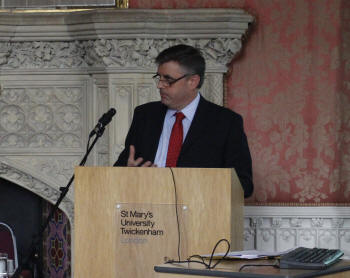 We gathered for this wonderful conference on 31st of July and were
reminded by a variety of inspirational speakers of the depth of our
calling as Christians within the healthcare profession. There were
several themes that shone for many of us through the day.
We gathered for this wonderful conference on 31st of July and were
reminded by a variety of inspirational speakers of the depth of our
calling as Christians within the healthcare profession. There were
several themes that shone for many of us through the day.
Fr John O’Leary commenced the day, highlighting the importance of spiritual care and reminded us of the compassion of the Lord – ‘Jesus, seeing the crowds of people who followed him, realised that they were tired and exhausted, lost and without a guide, and he felt deep compassion for them' (Mt 9:36).
Dr Trevor Stammers (GP and course director for Bioethics and Medical Law at St Mary's University) also emphasised the sad fact that modern healthcare is severely lacking in this simple yet profound element – ‘deep comcompassion'. He noted the Francis report, which repeatedly professes that ‘there should be an increased focus on compassion and caring' in modern healthcare. He also guided us through the many ethical issues in end of life care, including terminal sedation, clinically assisted hydration and nutrition, and the emerging concept of ‘Organ Donation Euthanasia'.
 Teresa Lynch (Palliative Care specialist and Chair of the group of
nurses against Euthanasia) explained that the meaning of ‘compassion' ‘to
be with the suffering'. She used examples from Tolstoy's The Death of Ivan
Ilyich” to highlight the profound pain and aloneness that many of our
dying patients face – ‘....he had to live thus all alone on the brink of
an abyss, with no one who understood or pitied him.' Fr O'Leary had noted
earlier that we can ‘accompany our patients even when they have died'
through prayer, and that this act itself is a gesture of mercy.
Teresa Lynch (Palliative Care specialist and Chair of the group of
nurses against Euthanasia) explained that the meaning of ‘compassion' ‘to
be with the suffering'. She used examples from Tolstoy's The Death of Ivan
Ilyich” to highlight the profound pain and aloneness that many of our
dying patients face – ‘....he had to live thus all alone on the brink of
an abyss, with no one who understood or pitied him.' Fr O'Leary had noted
earlier that we can ‘accompany our patients even when they have died'
through prayer, and that this act itself is a gesture of mercy.
We listened in awe to Colin Harte – former carer for Alison Davies – a woman who suffered a persistent and ‘total' pain, and yet who found such meaning in her suffering that she called it ‘the greatest privilege'. She reminded us through Colin of the ‘infinite value' of a human being and the need to fight for human dignity and worth in today's world.
Professor Pullicino (Professor of Neurology) shared his experiences of Palliative Care, and Dr Adrian Treloar (Consultant Psychiatrist) tackled Dementia and the severe distress that these vulnerable patients often suffer, and which can pose a challenge to those caring for them.
The conference itself was interjected with much rich and valuable discussion, and many of us left feeling inspired to continue our work with refreshed vigour and depth. Themes of compassion, suffering, and the fundamental value of human life need to stay with us as we progress through our medical careers. It was Hippocrates who said ‘Cure sometimes, Relieve often, Comfort always'. We are privileged to be called to the vocation of medicine, and to have such fine examples in the beings of Our Lady and Our Lord Jesus Christ Himself.
Specialty Doctor in Palliative Medicine
Palliative Care Conference
In July, the Catholic Medical Association held a Conference on Palliative Care, in Twickenham. Despite having such a great distance to travel, I decided that since End of Life Care can be described as a stumbling block to conscientious Christians, I wanted to ‘know my stuff' and would attend in the hope of gaining practical advice and techniques of both delivering exceptional care, and surviving amidst tunnel-visioned, protocol-driven healthcare settings. To this end, I was most grateful to find that I was both offered accommodation on the nights I needed, and a student rate. I stayed on campus in the student halls and was generally pleased with my room and meals – despite joking about the compactness of the shower: “I wasn't sure whether it was a shower, or a walk-in sink!”
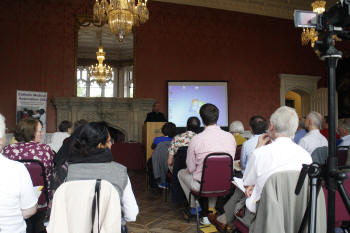 In fitting manner, the Chaplain made the first address, alluding to the
importance of the life of grace: we can remedy many conditions, but
ultimately all our input is transient since both we and every patient will
ultimately leave this world. We might well ask ourselves, ‘Has my practice
and evangelisation (as regrettably subtle as the times demand) been
focused on the life of grace for life in Heaven, or on this world, which
will pass away?'
In fitting manner, the Chaplain made the first address, alluding to the
importance of the life of grace: we can remedy many conditions, but
ultimately all our input is transient since both we and every patient will
ultimately leave this world. We might well ask ourselves, ‘Has my practice
and evangelisation (as regrettably subtle as the times demand) been
focused on the life of grace for life in Heaven, or on this world, which
will pass away?'
Whilst I didn't feel I received the wealth of practical strategies I'd hoped to find (such as, “If you are confronted with ‘A', say this...” or advice on how to query/challenge over-use of opioids or anxiolytics), I did receive numerous references to studies of interest, and felt buoyed up by knowing there were so many others in practice who shared my concerns.
It is my hope that the CMA will continue to hold conferences to share knowledge and skills, and in both increasing frequency and varying areas –especially some further north, where Catholics often feel neglected by many groups.
The conference utilised speakers from a variety of backgrounds and disciplines, offering testimony and demonstrating expertise as carers, nurses and physicians. Along with attendee contributions they highlighted both the successes and the inherent flaws in contemporary healthcare training, and offered an insight into raising it to the heights. Further conferences could build on this.
Andrew McDowall is a student nurse
Mass for the repose of the souls of deceased members of the CMA.
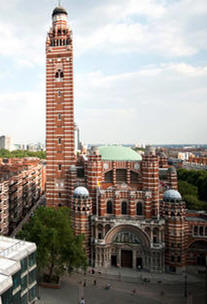 The 10:30am Mass at Westminster Cathedral, London, on Saturday 27th
August, was offered for the repose of the souls of deceased members of the
CMA. In attendance were around 16 current members who had travelled from
near and far, ranging from retired consultants to medical students, nurses
to religious sisters.
The 10:30am Mass at Westminster Cathedral, London, on Saturday 27th
August, was offered for the repose of the souls of deceased members of the
CMA. In attendance were around 16 current members who had travelled from
near and far, ranging from retired consultants to medical students, nurses
to religious sisters.
Afterwards, over coffee and a lovely breakfast (the eggs benedict were particularly good), we enjoyed interesting discussion on topics ranging from medicine to bioethics to the Olympics. It was a great opportunity for old friends to catch up and newer members to strengthen friendships forged at the recent CMA conference. In particular, it was very pleasing to welcome one or two brand new faces to the group. Keep an eye out for something similar happening soon!
The author is a junior doctor working in Yorkshire
